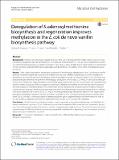Deregulation of S-adenosylmethionine biosynthesis and regeneration improves methylation in the E. coli de novo vanillin biosynthesis pathway
Author(s)
Hyun, Jason C.; Kunjapur, Aditya Mohan; Prather, Kristala L. Jones
Download12934_2016_Article_459.pdf (3.322Mb)
PUBLISHER_CC
Publisher with Creative Commons License
Creative Commons Attribution
Terms of use
Metadata
Show full item recordAbstract
Background
Vanillin is an industrially valuable molecule that can be produced from simple carbon sources in engineered microorganisms such as Saccharomyces cerevisiae and Escherichia coli. In E. coli, de novo production of vanillin was demonstrated previously as a proof of concept. In this study, a series of data-driven experiments were performed in order to better understand limitations associated with biosynthesis of vanillate, which is the immediate precursor to vanillin.
Results
Time-course experiments monitoring production of heterologous metabolites in the E. coli de novo vanillin pathway revealed a bottleneck in conversion of protocatechuate to vanillate. Perturbations in central metabolism intended to increase flux into the heterologous pathway increased average vanillate titers from 132 to 205 mg/L, but protocatechuate remained the dominant heterologous product on a molar basis. SDS-PAGE, in vitro activity measurements, and l-methionine supplementation experiments suggested that the decline in conversion rate was influenced more by limited availability of the co-substrate S-adenosyl-l-methionine (AdoMet or SAM) than by loss of activity of the heterologous O-methyltransferase. The combination of metJ deletion and overexpression of feedback-resistant variants of metA and cysE, which encode enzymes involved in SAM biosynthesis, increased average de novo vanillate titers by an additional 33 % (from 205 to 272 mg/L). An orthogonal strategy intended to improve SAM regeneration through overexpression of native mtn and luxS genes resulted in a 25 % increase in average de novo vanillate titers (from 205 to 256 mg/L). Vanillate production improved further upon supplementation with methionine (as high as 419 ± 58 mg/L), suggesting potential for additional enhancement by increasing SAM availability.
Conclusions
Results from this study demonstrate context dependency of engineered pathways and highlight the limited methylation capacity of E. coli. Unlike in previous efforts to improve SAM or methionine biosynthesis, we pursued two orthogonal strategies that are each aimed at deregulating multiple reactions. Our results increase the working knowledge of SAM biosynthesis engineering and provide a framework for improving titers of metabolic products dependent upon methylation reactions.
Date issued
2016-04Department
Massachusetts Institute of Technology. Synthetic Biology Center; Massachusetts Institute of Technology. Department of Chemical EngineeringJournal
Microbial Cell Factories
Publisher
BioMed Central
Citation
Kunjapur, Aditya M., Jason C. Hyun, and Kristala L. J. Prather. “Deregulation of S-Adenosylmethionine Biosynthesis and Regeneration Improves Methylation in the E. Coli de Novo Vanillin Biosynthesis Pathway.” Microbial Cell Factories 15, no. 1 (April 11, 2016).
Version: Final published version
ISSN
1475-2859